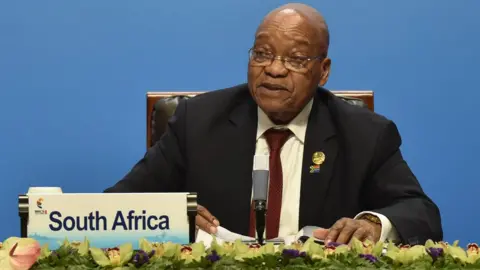Bell Pottinger expelled from trade body for South African campaign
 Shutterstock
ShutterstockBell Pottinger has been expelled from the UK public relations trade body for its work on a controversial contract in South Africa.
It is the first time that the Public Relations and Communications Association (PRCA) has ejected a PR firm as prominent as Bell Pottinger.
PRCA director-general Francis Ingham said it was "highly questionable" whether the firm would survive.
Bell Pottinger said it "accepts that there are lessons need to be learned".
The PR firm's work on a campaign for Oakbay Capital, a South African company owned by the wealthy Gupta family, had "incited racial hatred" and was "absolutely unthinkable", Mr Ingham said.
He expected more clients to abandon Bell Pottinger following the sanction.
South Africa's opposition Democratic Alliance complained to the PRCA, accusing Bell Pottinger of a "hateful and divisive campaign to divide South Africa along the lines of race".
The campaign emphasised the power of white-owned businesses and used the #WhiteMonopolyCapital hashtag.
South African President Jacob Zuma has faced corruption allegations and suspicion over his ties with the Guptas. Mr Zuma and the Guptas have consistently denied all allegations.
 Getty Images
Getty ImagesChief executive James Henderson resigned ahead of the five-year expulsion from the PRCA. His departure was "necessary, but not sufficient", Mr Ingham said.
"Bell Pottinger has brought the PR and communications industry into disrepute with its actions, and it has received the harshest possible sanctions," he added.
The firm was found to have breached two clauses of the PRCA's professional charter and two clauses of its public affairs and lobbying code of conduct.
The law firm Herbert Smith Freehills was commissioned by Bell Pottinger to conduct an internal review following the Oakbay controversy.
Its review, released on Monday, criticised the PR firm's senior management: "Bell Pottinger senior management should have known that the campaign was at risk of causing offence, including on grounds of race.
"In such circumstances, BP ought to have exercised extreme care and should have closely scrutinised the creation of content for the campaign. This does not appear to have happened."
Learning lessons
Herbert Smith also found that certain material created by Bell Pottinger for the economic emancipation campaign "was negative or targeted towards wealthy white South African individuals or corporates and/or was potentially racially divisive and/or potentially offensive and was created in breach of relevant ethical principles".
In a statement Bell Pottinger said it "acknowledges the PRCA ruling, accepts that there are lessons to be learned but disputes the basis on which the ruling was made".
It added: "The overwhelming majority of our partners and employees played no part in the Oakbay Capital account and have not been accused of breaching the PRCA code. Many of them will now consider applying for individual membership.
"With the Herbert Smith Freehills findings made publicly available and the PRCA ruling published, the business can refocus on delivering outstanding work for our clients and looking after our people."
Bell Pottinger has already lost clients over the affair, including luxury goods company Richemont and investment firm Investec. The further reputational damage could see other clients sever their ties.
On Tuesday, Labour peer Peter Hain was due to table questions in the House of Lords asking if Bell Pottinger's actions contravened any UK trade policies.
The PR firm, founded by Lord Tim Bell, was closely associated with Margaret Thatcher and the Conservative Party in the 1980s.
Speaking on Newsnight on Monday, Lord Bell, who resigned from Bell Pottinger last year, said the PRCA report marked a "disappointing" day for the company.
He stood down, he told Newsnight, because it had been wrong to take on the Oakbay account. Lord Bell denied accusations he played a role in securing the business.
Bell Pottinger has gone on to accept contracts from many controversial clients, including former South African president FW de Klerk, when he opposed Nelson Mandela; Asma al-Assad, the wife of Syrian president Bashir al-Assad; arms manufacturer BAE Systems; and the South African athlete Oscar Pistorius after he was charged with murder.
